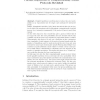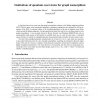88 search results - page 15 / 18 » Reducing hard SAT instances to polynomial ones |
TCC
2007
Springer
14 years 1 months ago
2007
Springer
Abstract. Parallel repetition is well known to reduce the error probability at an exponential rate for single- and multi-prover interactive proofs. Bellare, Impagliazzo and Naor (1...
STOC
2006
ACM
14 years 1 months ago
2006
ACM
It has been known for some time that graph isomorphism reduces to the hidden subgroup problem (HSP). What is more, most exponential speedups in quantum computation are obtained by...
CRYPTO
2011
Springer
12 years 7 months ago
2011
Springer
We present a somewhat homomorphic encryption scheme that is both very simple to describe and analyze, and whose security (quantumly) reduces to the worst-case hardness of problems ...
CORR
2010
Springer
13 years 7 months ago
2010
Springer
Abstract Anna Blasiak Robert Kleinberg Eyal Lubetzky Index Coding has received considerable attention recently motivated in part by applications such as fast video-on-demand and e...
DNA
2007
Springer
14 years 1 months ago
2007
Springer
In search for “realistic” bio-inspired computing models, we consider asynchronous spiking neural P systems, in the hope to get a class of computing devices with decidable prope...


